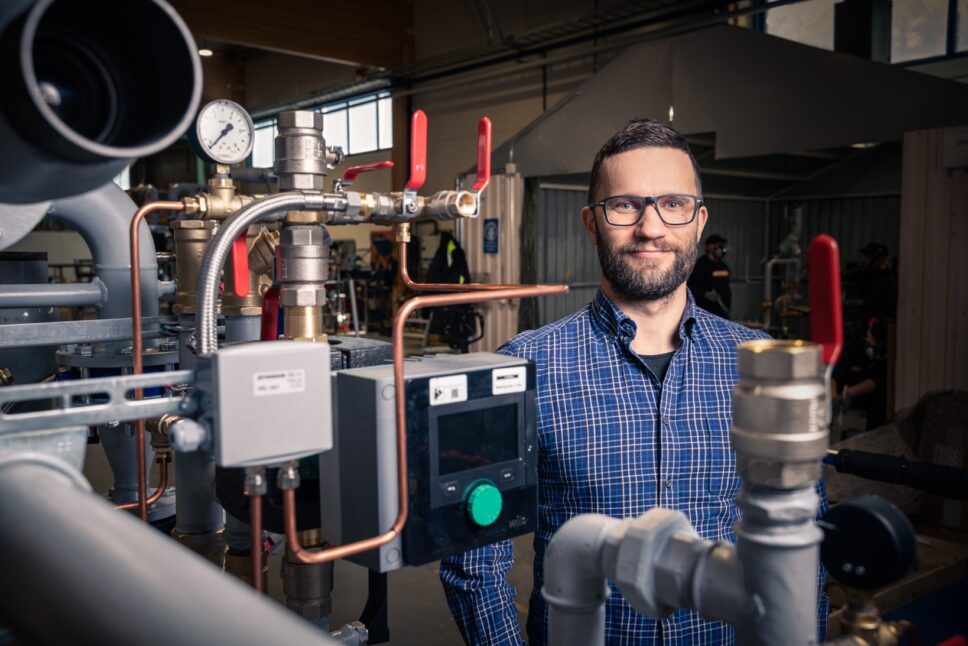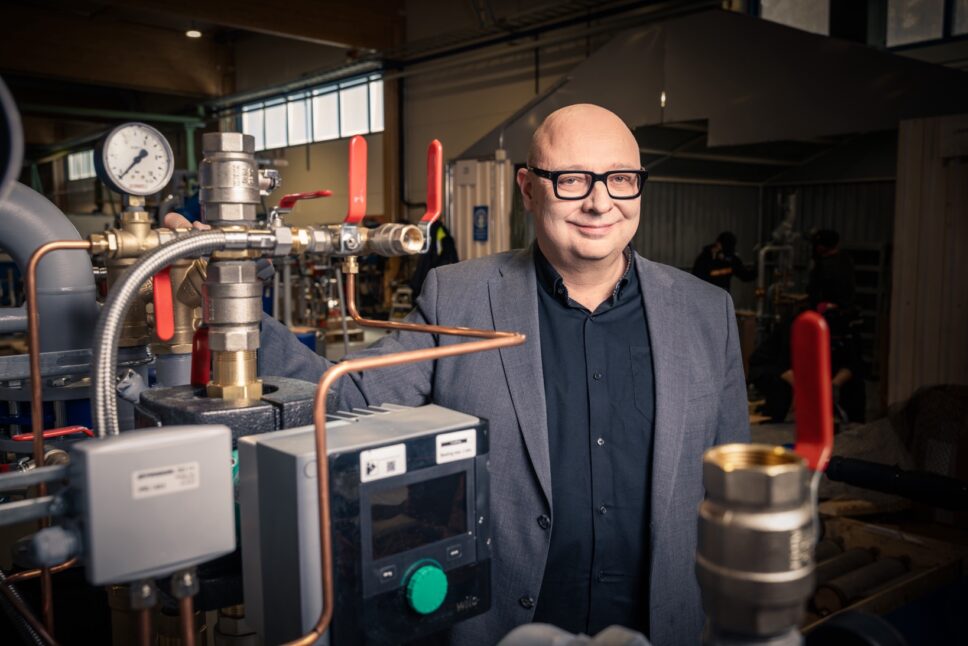Gebwell is investing and expanding as a pioneer in ecological cooling and heating solutions

Gebwell, based in North Savo, seeks growth as a forerunner in ecological cooling and heating solutions. It was among the first Finnish companies to bring heat pumps to large buildings.
Keeping up with the trend of increasing use of real estate heat pumps has been good business. Gebwell, based in Leppävirta, North Savo, increased its turnover by more than 15 per cent in 2021 and has continued to grow since.
“Many companies in the industry have focused on detached houses and small buildings. Heat pumps for these applications are produced in large numbers in Europe, but not as many companies specialise in real estate heat pumps. We have focused our efforts on them,” says Petrus Monni, Sales Director at Gebwell.
Gebwell’s main business consists of ground-source heat pumps, district heating distribution substations, and energy storage units, which are often ancillary to heat pump solutions.
- Gebwell was established in Leppävirta, North Savo, in 2006. The company’s headquarters and production facilities are in Leppävirta.
- Subsidiaries in Sweden and Poland.
- Supplies environmentally friendly and ecological heating and cooling solutions. Customers include HVAC contractors, and the end users are especially large corporate real estate owners and housing companies.
- Aims to take a significant role in producing environmentally friendly solutions as part of the energy transition.
- The company employs almost 300 people.
- Turnover was EUR 53 million in 2022.
“These technologies are the most environmentally friendly and future-proof solutions today, and they will remain so in the future. Naturally, environmental friendliness depends on where the electricity comes from,” Monni states.
He points out that Nordic district heating is already low in emissions by international standards – “the world’s best district heating”.
Efficient energy recycling
Ten years ago, heat pumps and district heating were at loggerheads, but now, district heating is increasingly produced using heat pumps to save energy.
“The fundamental idea behind our pioneering approach is that if energy is obtained from something, it should be recycled as efficiently as possible and used in the building. The heat pump puts waste energy to new uses, and efforts are made to maximise the utility obtained from the energy within the building,” says Janne Rahunen, Gebwell’s CEO.
Heat pumps enable condensing heat to be used.
“Lots of commercial properties containing refrigeration and freezer equipment are now being renovated so that the building is heated with condensing heat,” Monni says.

The waste heat from large data centres can also be utilised. It cannot be used directly, but ground-source heat pump technology can feed it into the district heating network. This reduces the amount that must be invested in district heating and new plants in the future.
Monni says sustainable heating and cooling solutions are already well-known in Finland and the Nordic countries. However, they are less well-known elsewhere in Europe. For example, heat pumps may be used in detached houses in Poland, but the public is less aware that heat pumps can also heat large properties.
“We use ground-source heat at our factory in Poland. This is often an eye-opening experience for our visitors.”
The new factory in Poland – a EUR 3.5 million investment – was commissioned last year. It will double in size in the future.
Energy-efficient use and recycling
A heat pump is a long-term investment that depends on equipment choices, the “drive style”, and proper servicing.
Gebwell’s ground-source heat pumps collect heat from the bedrock, and the pumps themselves are free of fossil fuels. Electricity is needed to run the heat pump. If this electricity is emission-free, the solution is entirely fossil-free.
The life cycle of a heat pump depends on the operating conditions.
“An expert service technician can observe and guide customers on the energy-efficient use of the device. Energy-efficient operation and a long life cycle often go hand in hand,” Janne Rahunen says.
The design and installation work also affects environmental friendliness.
“Broadly speaking, a heat pump can be compared to a car. It is serviced along the way, and the conditions vary. Some drivers use a bit more power than others. It is the same for heat pumps. The operating mode and quality of servicing affect the life cycle,” Rahunen says.
In addition, the components inside the heat pump are steel and copper, so they are recyclable. The refrigerants, which are considered hazardous waste, can also be recycled. The compressor oil is sent to a processing plant. The recycling fees for Gebwell’s heat pumps have already been paid.
New research and development lab
Growth based on the green transition has required the company to invest in research and development, real estate and machinery and create a strong network of subcontractors. The latest investment is a new laboratory in Leppävirta.
“The new laboratory will allow us to develop our products further. We will also be able to launch larger entities. It is a big investment. However, our people and their expertise make the greatest contribution,” Rahunen says.
Both managers praise Gebwell’s committed and skilled personnel.
“We have a big responsibility in our locality because we are a large employer. We look after our people,” Rahunen says.

Gebwell has used IoT solutions in research and development and collected operating data from heat pumps for several years. IoT also enables energy to be optimised between properties.
“It is definitely our next step. We no longer optimise events based on one unit – we work on a larger scale. We also use several energy sources: the sun, wind and cheap electricity,” Rahunen lists.
For example, when electricity prices were sky-high last winter, Gebwell’s devices were controlled according to the electricity price. When the price was low, the machine output more heat – and when it was high, the output went down.
Easier installation and relief for the shortage of experts
The company has also developed heat pump automation.
“Contractors often need to assemble a system from many parts. We have tried to make the puzzle easier. We make heat pump solutions that allow a wider group of customers to have heat pumps installed,” Monni says.
Gebwell’s customers include industry giants such as Tom Allen Senera and ST1 Lähienergia. Other customers only install a few heat pump systems per year.
“We help them by providing products and ancillary services. In addition, this is one tool for relieving the shortage of experts,” Monni says.
Gebwell’s message to the government
- “I would like the government to lower the barriers to investment in clean energy during the current economic upheaval to prevent sudden stops. The price of transportation to foreign countries needs to become more reasonable. A lot of components are imported to Finland, refined here, and then exported. Transportation is quite expensive, and we compete with companies who do not need as much transportation. Foreign trade significantly dents our profitability.”
The CEO praises his customers’ role in research and development.
“They have made a huge contribution to product development projects. Cooperating with customers has helped us learn which solutions are actually needed in the field and which direction our development should go in. Of course, European legislation sets out a broad framework for us, but we need to consult our customers for the nuances and subtleties.”
Teksti: Marjo Vuorinen
Kuvat: Markus Aspegren
